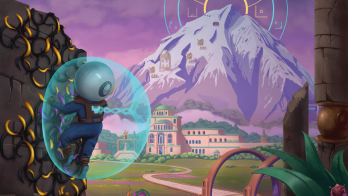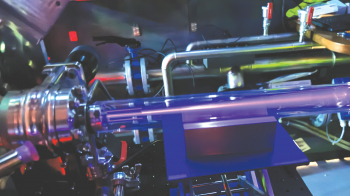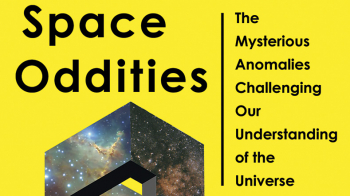Jeff Wiener explains how CERN’s national and international teacher programmes inspire and empower thousands of teachers and, through them, their students.

“The reason I want to talk to you today is that I myself had a very good physics teacher, which is why I’m now here at CERN. So, thank you for the important work you are all doing. You really make a difference!” This heartfelt sentiment, echoing the gratitude often expressed by CERN scientists when addressing visiting high-school teachers, encapsulates the essence of CERN’s teacher programmes.
Over the past quarter-century, CERN’s teacher programmes have played a vital role in bridging the gap between particle physics and educators from across the globe. What started originally in 1998, when the first International High School Teacher Programme took place with a small group of teachers, has grown into one of CERN’s many success stories. Today, CERN’s teacher programmes run on an almost weekly basis, welcoming about 1000 teachers from more than 60 countries every year, which makes them one of the largest and most successful professional development offers for in-service high-school science teachers worldwide.
The vast bulk are week-long programmes for teachers from one country or from one language group, predominantly targeting teachers from CERN’s member states, associate member states and the occasional non-member state. In addition, two international teacher programmes take place every year in the summer, significantly broadening the reach. Each international teacher programme lasts two weeks and hosts up to 48 teachers from around the world. So far, about 14,500 teachers from 106 countries have participated in CERN’s national and international teacher programmes, and every year another 1000 teachers travel to CERN to attend lectures, on-site visits, hands-on workshops, discussions and Q&A sessions.
Multifaceted
Teacher programmes at CERN serve multiple purposes. First and foremost, they are professional development programmes that enable high-school teachers to keep up to date with the latest developments in particle physics and related areas, and to experience a dynamic, international research environment. As such, they answer the call to bring more modern science into the classroom, which goes hand in hand with a slow yet steadily increasing change in curriculum development (see Particle physics in school curricula). Second, teacher programmes are an acknowledgement of the critical role that teachers play in preparing the future of humanity. They inspire and empower teachers and, through them, their students. Last but not least, teacher programmes showcase the importance of science diplomacy – colloquially referred to as a soft power in the world of international relations. For instance, before joining CERN as associate member states, several countries already brought high-school teachers to CERN for dedicated national teacher programmes; these, in turn served as door-openers in the respective ministries and supported the country’s application to join CERN. The same is true for distant countries, with which CERN has no other connections than teachers who took part in one of the international teacher programmes.
High impact
But what about the impact of CERN’s teacher programmes? Is it possible to measure the effectiveness of such a variety of programmes and perform an evaluation that goes beyond documenting teachers’ feedback? Combined with anecdotal data from alumni teachers, who frequently return to CERN with their students or take part in other education activities such as the Beamline for Schools (BL4S) competition, and the fact that CERN’s teacher programmes are heavily overbooked, the overall picture is clear: teachers’ satisfaction with CERN’s teacher programmes is extremely high.
The overall picture is clear: teachers’ satisfaction with CERN’s teacher programmes is extremely high
To deepen the level of evaluation of CERN’s teacher programmes and to allow for further development in the future, in 2021 a multi-stakeholder study was performed to document and illustrate the goals of professional development programmes at particle-physics laboratories. This study led to a hierarchical list of the 10 most important learning goals, such as enhancing teachers’ knowledge of scientific concepts and models, and enhancing their knowledge of curricula, which now represent the baseline for future evaluations of teachers’ learning. Here, a large-scale study is currently ongoing to assess their knowledge in a pre-post setting by using concept maps. The aim of this approach is not only to study the learning progression throughout a teacher programme but also to support teachers in constructing meaningful mental models and knowledge structures, which are key indicators of successful educators. Indeed, CERN’s teacher programmes continue to serve as a prime testbed for the Organization’s physics-education research efforts, with one doctoral research project already successfully completed and a second on its way. Future research projects will aim to evaluate teachers’ use of their new knowledge and skills after their participation in CERN’s teacher programmes and consequently their students’ learning outcomes.
The most important dimension of CERN’s teacher programmes, however, is the social one. Over the past 25 years, teachers from different parts of the world have met at CERN, became friends and remained in touch with one another. This has led to several cross-border Erasmus projects, combined school events and even tri-national proposals for the BL4S competition.
Today, CERN’s teacher programmes are more popular than ever, with teachers from all around the world being more than eager to apply for one of the limited spots. One participant of this year’s International High School Teacher Programme even had to move his wedding date, which originally coincided with the programme dates. Luckily, his fiancée was understanding and not only agreed to the postponed date but also smiled when he put on his CERN helmet for the wedding picture.







